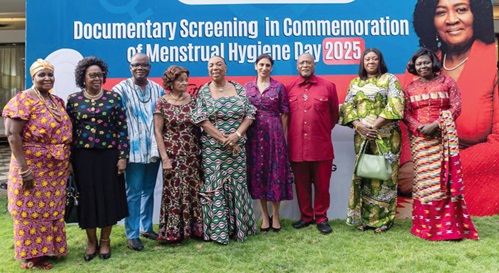The Vice-President, Prof. Naana Jane Opoku-Agyemang, has reaffirmed the government’s commitment to ending period poverty and stigma as part of a wider push for gender equity in education.
To address the challenge, she said, the government had launched the Free Sanitary Pads Programme, a nationwide initiative designed to eliminate menstruation-related issues.
On a speech read on her behalf by a member of the Council of State, and former Attorney General, Betty Mould-Iddrisu, at the premiere of a documentary, the Vice-President, described the initiative as “one of the most extensive menstrual health initiatives in our nation’s history”.
The programme, she said, was designed to ensure that no girl was forced to stay out of school simply because she menstruated.
“We are delivering free sanitary pads to girls in basic and secondary schools across the country, while also investing in menstrual hygiene education and infrastructure,” she said.
Background
The documentary, dubbed “The Barred by Blood – The Cultural Chains Holding Back Girls in Kyekyewere” is set in Kyekyewere and exposes the struggles of adolescent girls forced to miss school during their periods due to harmful cultural taboos, a lack of proper sanitation facilities and their inability to afford sanitary pads.
The river, a central part of their lives, is associated with taboos, such as women not crossing on Tuesdays or while menstruating because they are believed to cause drowning.
The premiere was to mark the Menstrual Hygiene Day, a day celebrated every May 28 to raise awareness that investments in menstrual health can yield transformative impacts on girls’ and women’s lives.
This year's Menstrual Hygiene Day, on May 28, 2025, is on the theme: “Together for a #Period FriendlyWorld”, urging collective action to ensure that menstruation does not limit access to education, health or opportunity.
Present were the Chief of Staff at the Office of the Vice-President, Alex Segbefia; the Deputy Minister of Education, Dr Clement Apaak; the Policy Advisor, Political, Dr Samuel Ofosu-Ampofo; Policy Advisor, Finance, Mansa Amoa Awuah, and the Member of Parliament for Kyekyewere, Ankomah Emelia.
Also present were staff of the British High Commission, members of the Diplomatic Corps, development partners, civil society representatives, presidential staffers, traditional leaders, religious leaders, education and health professionals, as well as some girls and boys from Kyekyewere.
Not a curse
Prof. Opoku-Agyemang said menstruation was not a curse, not a taboo, and should not be a reason for any girl to drop out of school.
She said it was a natural part of life and it must be treated as such, with dignity, education and care.
“When we talk about education for girls, we must also talk about water, toilets, privacy, products and respect,” the Vice-President said.
Prof. Opoku-Agyemang called for collective efforts to strengthen and resolve menstrual issues to build a Period-Friendly Ghana, where no girl was not barred by blood, and where every girl can walk confidently into a future of equal opportunity.
“Let it be a moment that moves us all — from awareness to action, from silence to advocacy, and from marginalisation to empowerment,” she added.
Commendation
The Deputy Director of Development, at the British High Commissioner, Samina Bhatia, lauded the government for its commitment to prioritising menstrual hygiene and period health, describing it as a “pivotal shift” in the public discourse around period health.
She commended the government's efforts—particularly those led through the Office of the Vice-President—for placing menstrual health high on the national agenda.
Ms Bhatia underscored the importance of menstrual health in achieving human rights, gender equality and the Sustainable Development Goals (SDGs), especially those related to education, health and economic empowerment.
She, however, said the issue was often ignored, sidelined or spoken about in hushed tones and euphemisms, and was a stigma in many cultures, including Ghana and her Indian heritage.
Ms Bhatia called for collective efforts to change the narrative, to shift the dialogue and empower girls to embrace this issue, which is essential not only to their reproductive health but to their future, and all of ours. It is also vital to ensure they fulfil their potential.
She commended the government for the distribution of menstrual hygiene products to girls but emphasised that the bigger challenge lay in ensuring sustainable access, especially in the face of inflation and rising costs.
She also lauded the country’s Affirmative Action Bill as a source of hope, adding that it provides a strong legislative framework to address systemic gender inequalities, including those tied to menstrual health.
The Minister for Gender, Children and Social Protection, Dr Agnes Naa Momo Lartey, said menstrual hygiene remained a sensitive but critical issue in communities.
"The stigma, silence and infrastructural gaps continue to hold girls back, not just in school but in society," she said.
The documentary, she said, spoke truth to the challenges that many girls across the country continued to face when during their periods.

